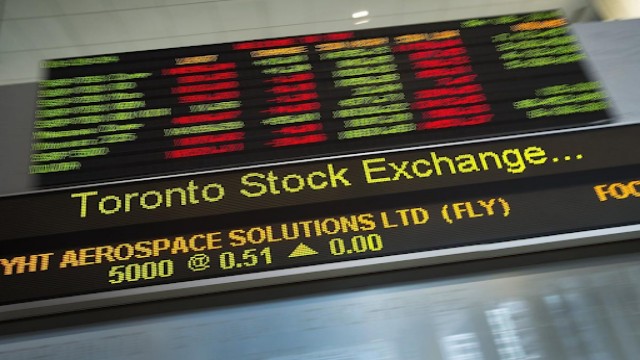
Stock market data moves across a digital ticker at the TMX Group headquarters in Toronto’s financial district on May 9, 2014. (THE CANADIAN PRESS/Darren Calabrese)
Canada’s stock market remained unchanged on Thursday, while U.S. markets saw a dip following President Donald Trump’s announcement of new tariffs on the auto sector. These tariffs, set to take effect next week, are expected to disrupt the industry, raising concerns among automakers and economic analysts alike.
Industry leaders warn that the new trade barriers could severely impact the auto sector, leading to job losses on both sides of the U.S.-Canada border. Additionally, consumers may face higher car prices due to the increased costs imposed by the tariffs. Michael Greenberg, head of Americas portfolio management at Franklin Templeton Investment, described the new measures as “pretty punitive,” particularly for countries like Canada.
Despite the announcement, financial markets did not experience a dramatic downturn like in previous tariff-related news. Analysts suggest that investors may be taking a wait-and-see approach, holding off major reactions until the new policies take effect on April 2.
By the end of the trading session, Canada’s S&P/TSX composite index remained flat at 25,161.06. Meanwhile, U.S. stocks saw losses, with the Dow Jones Industrial Average dropping 155.09 points to 42,299.70. The S&P 500 declined by 18.89 points to 5,693.31, and the Nasdaq composite slid 94.98 points to 17,804.03.
Automakers bore the brunt of the market downturn. General Motors shares dropped 7.4%, while Ford fell by 3.9%. Other global car manufacturers also saw declines. However, electric vehicle companies fared better, with Tesla making slight gains and Rivian jumping 7.6%, thanks to their higher U.S.-based production.
A report released Thursday indicated that the U.S. economy grew faster than expected last quarter. However, experts caution that while immediate economic data does not yet reflect the impact of tariffs, business and consumer confidence are showing signs of strain. Greenberg warned that prolonged uncertainty could eventually take a toll on economic growth, while also driving inflation higher.
The Canadian dollar slipped slightly, trading at 69.89 cents US compared to 70.09 cents US the previous day.
In commodities, the May crude oil contract rose by 27 cents to US$69.92 per barrel. Natural gas for May increased by six cents to US$3.93 per MMBtu. Gold prices surged, with the June contract up US$38.60 at US$3,090.90 an ounce, while copper fell by 12 cents to US$5.12 a pound.















